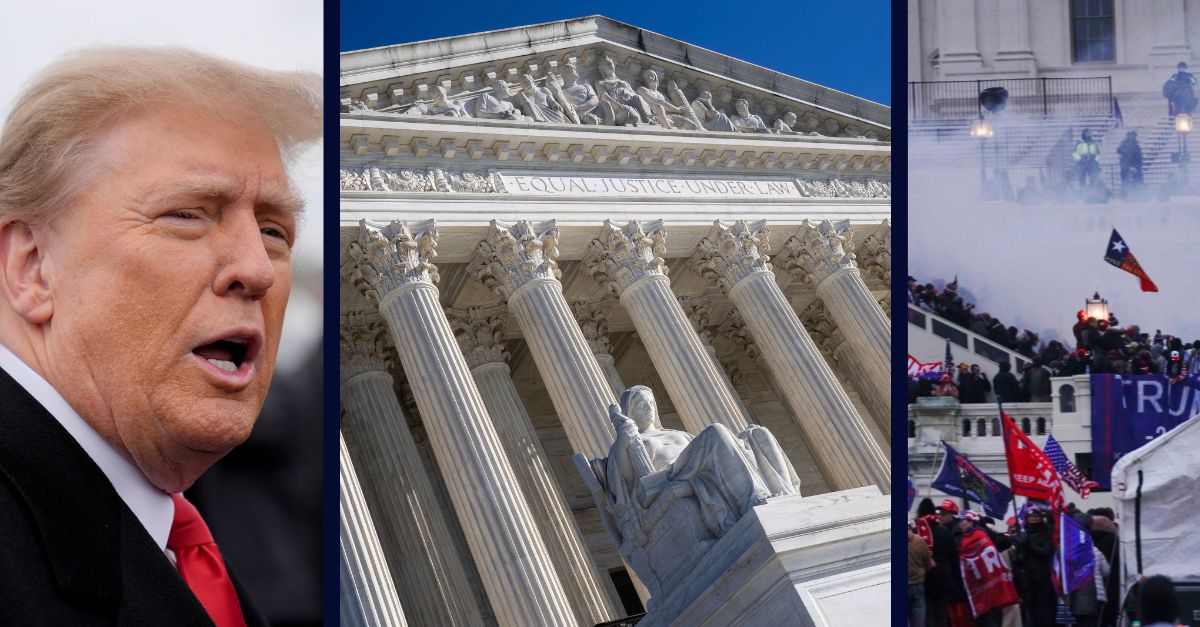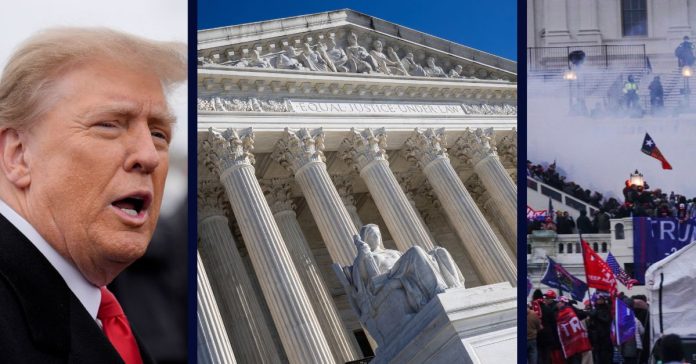
Left: Donald in Londonderry, N.H., Jan. 2024. (AP Photo/Matt Rourke)/Center: The U.S. Supreme Court. Jan. 2024. (Francis Chung/POLITICO via AP)/Right: Trump supporters seize the Capitol building on Jan. 6, 2021. John Nacion/STAR MAX/IPx.
Early voting in Colorado has been well underway and Super Tuesday is only days away with presidential primaries opening in 16 states and Donald Trump as the front-runner and presumptive nominee for the Republican Party. Despite this, the U.S. Supreme Court is still silent on whether it will remove the former president from the ballot in Colorado or keep him on despite findings from two lower courts that he engaged in insurrection.
The high court heard arguments over three weeks ago, fielding questions on the balance between state and federal powers and with Chief Justice John Roberts — and several other justices — expressing skepticism over whether a national election could “come down to just a handful of states.”
It seems unlikely that the court will rule in favor of Colorado voters who argue Trump’s conduct leading up to and on the Jan. 6 attack on the Capitol should disqualify him under Section III of the Fourteenth Amendment. The statute states that no person having previously taken an oath as an “officer of the United States” and is found to have engaged in insurrection is qualified to hold office.
As a decision that could drastically shape the rest of the 2024 election season lurks just out of sight, the legal drama was otherwise unabated in Trump’s world for yet another week.
Law&Crime takes a look at those developments and others in Trump’s cases in Florida, Georgia, Washington, D.C., and New York.
FLORIDA
CRIMINAL
In his classified documents case before U.S. District Judge Aileen Cannon, a trial date was not yet set as of Friday.
Special counsel Jack Smith pushed back against claims from Trump’s defense lawyers that his prosecution for allegedly retaining hundreds of classified documents was improper because it was too close to the 2024 election.
Smith told her department rules are clear: procedure on protecting government integrity by avoiding “Actions that May Have an Impact on an Election” — does not apply to Trump since he was indicted back in June 2023, well outside of the timeline of the so-called “60-day rule.”
Trump wants the trial to play out after the election — if at all — while Smith is gunning for July 8, which Cannon reportedly referred to as “unrealistic.”
Smith also tore into the defendant this week for his ceaseless quest to name “all of the witnesses” in the prosecution’s case regardless of potential threats to their personal safety. Trump called that premise “absurd.” It’s been tense all week: the special counsel had earlier slammed Trump for his spewing of conspiracy theory about the case.
Smith also reiterated his position to presiding Judge Cannon early in the week that she needed to correct her “clear error” in the case. Cannon reportedly expressed skepticism about that from the bench on Friday.
Meanwhile, former Trump White House senior adviser Stephen Miller wants to be tagged in. He asked the court this week if he could participate in the case as an “amicus curiae” or a friend of the court. Miller thinks this would be a good fit because of his “expertise” in what he deems are abuses of the Presidential Records Act by the National Archives.
The proposed jury questionnaire is also firming up in Florida.
OF NOTE: Speaking of presidential records, another Trump aide, former trade adviser Peter Navarro, is still looking for a way to avoid going to prison.
GEORGIA
CRIMINAL
Closing arguments were held Friday in the disqualification hearing for Fulton County District Attorney Fani Willis. A defendant in the sprawling case involving Trump and 17 others, accused Willis of having an improper relationship with special prosecutor Nathan Wade. Lawyers for that defendant, Mike Roman, argued Friday that even the “appearance of impropriety” should lead to Willis’ ouster.
Prosecutors have said the attempt to remove Willis is being done for no other reason than to harass and embarrass her.
Willis may have scored a small victory this week, however, when an attorney who the defendants’ lawyers previously claimed in court that Willis had begun dating Wade before Trump’s RICO case had begun, experienced a memory lapse.
OF NOTE: No active judge on the U.S. Court of Appeals for the 11th Circuit was interested in sitting en banc to rehear Mark Meadows’ case for moving his Georgia RICO case to federal court.
WASHINGTON, D.C.
CONSTITUTIONAL
As Colorado voters await a ruling from the U.S. Supreme Court, in Illinois this week, a judge removed Trump from that state’s presidential primary ballot.
Cook County Circuit Court Judge Tracie Porter issued the ruling, writing that a “preponderance of evidence” convinced her Trump had “engaged in insurrection.”
Porter’s order to remove him was stayed until he filed an appeal, setting the deadline for Friday. Trump filed an appeal just before midnight Thursday. With the U.S. Supreme Court’s ruling on Trump’s disqualification hanging in the balance, it is possible that the appeals court could extend a stay. Trump’s legal team has already asked for the hold.
The Illinois presidential primary is March 19.
CRIMINAL
Trump’s election subversion case before U.S. District Judge Tanya Chutkan is in a state of purgatory now that the high court granted cert to Trump’s petition and announced it would hear arguments on whether the former president has total presidential immunity from prosecution.
Oral arguments are set for April 22 and in response, calls for Justice Clarence Thomas to recuse intensified.
With special counsel Jack Smith on ice in Washington, D.C. and a ruling from the high court required before he can go forward, it could be midsummer before the Supreme Court issues a ruling. The term ends in June.
Chutkan indicated at prior hearings early on that she could tweak the schedule depending on the course of appeals but she has expressed little to no sympathy over the rigors of Trump’s political schedule. His “day job,” she told him in August, would not entirely spoil the normal order of proceedings.
NEW YORK
CRIMINAL
The hush money-election interference trial is still on track for March 25. Trump has pleaded not guilty to 34 counts including charges that he falsified business records to hide money he paid porn star Stormy Daniels as he vied for the White House in 2016.
Manhattan District Attorney Alvin Bragg this week asked for a limited gag order on Trump to stop him from making comments about potential witnesses publicly or other harassing statements aimed at court staff, prosecutors or their families. Trump is already under a narrow gag order in his case in Washington, D.C., and was under one when he faced a civil fraud trial in New York.
If nothing else gets in the way of the anticipated trial date, it will be first time in history a U.S. president has faced criminal trial.
CIVIL
Trump made another attempt to stay his court-ordered judgment of $83.3 million to the writer he sexually abused and defamed, E. Jean Carroll. Carroll’s lawyer, Roberta Kaplan replied in a scorched-earth memorandum in opposition, slamming the former president for efforts to stay the payment without any bond or other security, something she called, the “court filing equivalent of a paper napkin.”
If granted, Carroll will have little to no guarantee of collecting from Trump at all.
Trump has until March 2 to file a reply.
Have a tip we should know? [email protected]

